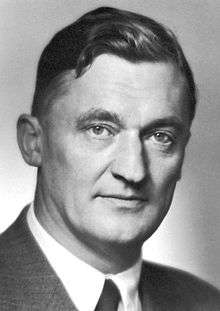Hugo Theorell
| Hugo Theorell | |
|---|---|
 Hugo Theorell | |
| Born |
6 July 1903 Linköping, Sweden |
| Died | 15 August 1982 (aged 79) |
| Residence | Sweden |
| Nationality | Swedish |
| Fields | Biochemistry |
| Notable awards | Nobel Prize in Physiology or Medicine (1955) |
Axel Hugo Theodor Theorell ForMemRS[1] (6 July 1903 – 15 August 1982) was a Swedish scientist and Nobel Prize laureate[2][3][4][5][6][7] in medicine.[8][9]
He was born in Linköping as the son of Thure Theorell and his wife Armida Bill. Theorell went to Secondary School at Katedralskolan in Linköping and passed his examination there on 23 May 1921. In September, he began to study medicine at the Karolinska Institute and in 1924 he graduated as a Bachelor of Medicine. He then spent three months studying bacteriology at the Pasteur Institute in Paris under Professor Albert Calmette. In 1930 he obtained his M.D. degree with a theory on the lipids of the blood plasma, and was appointed professor in physiological chemistry at the Karolinska Institute.
Theorell, who dedicated his entire career to enzyme research, received the Nobel Prize in Physiology or Medicine in 1955 for discovering the oxidation enzyme and its effects. His contribution also consisted of the theory of the toxic effects of sodium fluoride on the cofactors of crucial human enzymes. He was a former head of research of the Nobel Institute, the first researcher related to the Institute to be awarded a Nobel Prize.
His work had led to pioneering progress on ADH enzymes, which break down alcohol in the kidney. His work won praise in Sweden as well as around the world. He received honorary degrees at universities in France, Belgium, Brazil and the United States.
Theorell died in Stockholm and is buried in Norra begravningsplatsen (The Northern Cemetery) alongside his wife, Elin Margit Elisabeth (née Alenius) Theorell, a distinguished pianist and harpsichordist who died in 2002.
References
- ↑ Dalziel, K. (1983). "Axel Hugo Theodor Theorell. 6 July 1903-15 August 1982". Biographical Memoirs of Fellows of the Royal Society. 29: 584–526. doi:10.1098/rsbm.1983.0021. JSTOR 769814.
- ↑ Raju, T. N. (1999). "The Nobel chronicles. 1955: Axel Hugo Theodor Theorell (1903-82)". Lancet. 353 (9166): 1807. doi:10.1016/s0140-6736(05)75919-5. PMID 10348032.
- ↑ Shampo, M. A.; Kyle, R. A. (1998). "Hugo Theorell--Nobel Prize for study of enzymes". Mayo Clinic proceedings. Mayo Clinic. 73 (2): 147. doi:10.1016/s0025-6196(11)63646-x. PMID 9472997.
- ↑ Sulek, K. (1969). "Nobel prize for Hugo Axel Theorell in 1955 for the discovery of the explanation of the nature end action of oxidative enzymes". Wiadomosci lekarskie (Warsaw, Poland : 1960). 22 (1): 85. PMID 4892414.
- ↑ Margoliash, E. (1956). "Prof. Hugo Theorell, Nobel prize winner in medicine and physiology, 1955". Harefuah. 50 (7): 160. PMID 13318571.
- ↑ Zotterman, Y. (1956). "Winner of the Nobel prize for physiology and medicine for 1955, Hugo Theorell". Munchener medizinische Wochenschrift (1950). 98 (4): 126–127. PMID 13309262.
- ↑ Zotterman, Y. (1955). "The winner of the Nobel prize in medicine for 1955, Hugo Theorell". Die Medizinische (48): 1685–1686. PMID 13287683.
- ↑ Paul, K. G. (1982). "Hugo Theorell - more than half a century among the leaders of research". Lakartidningen. 79 (39): 3435–3437. PMID 6757611.
- ↑ Slater, E. C. (1970). "Tribute to Professor Theorell". Vitamins and hormones. 28: 147–150. PMID 4946799.
